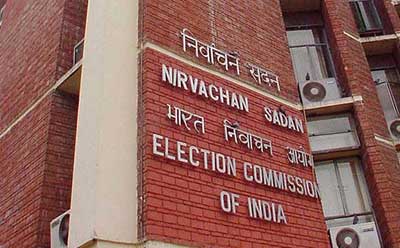Date: 02/12/2022
Relevance: GS-2: Appointment to various Constitutional Posts, Powers, Functions, and Responsibilities of various Constitutional Bodies.
Key Phrases: Dinesh Goswami Committee, reform in Election Commission, National Commission to Review the Working of the Constitution, Law Commission, collegium.
Why in News?
- A five-judge Constitution Bench of the Supreme Court is examining a bunch of petitions recommending reforms in the process of appointment of members of the Election Commission.
The matter of appointments by a collegium:
Appointment
- Under Clause (2) of Article 324, the Election Commission shall consist of the Chief Election Commissioner and such number of other Election Commissioners, if any, as the President may from to time, and the appointment of the Chief Election Commissioner and Election Commissioners shall, subject to the provisions of any law made in that behalf by Parliament, be made by the President.
- Dinesh Goswami Committee (1990):
- It suggested that the Chief Election Commissioner be appointed by the President (executive) in consultation with the Chief Justice of India and the Leader of the Opposition (and in case the Leader of the Opposition was not available, then consultation be held with the leader the largest opposition group in the Lok Sabha).
- It said this process should have statutory backing. Importantly, it applied the same criteria to the appointments of Election Commissioners, along with consultation with the Chief Election Commissioner.
- National Commission to Review the Working of the Constitution:
- The NCRWC, under Justice M.N. Venkatachaliah, said that the Chief Election Commissioner and other Election Commissioners should be appointed on the recommendation of a body comprising the Prime Minister, the Leaders of the Opposition in the Lok Sabha and the Rajya Sabha, the Speaker of the Lok Sabha and the Deputy Chairman of the Rajya Sabha.
- Law Commission:
- The 255th Report of the Law Commission, chaired by Justice A.P. Shah, said the appointment of all the Election Commissioners should be made by the President in consultation with a three-member collegium consisting of the Prime Minister, the Leader of the Opposition of the Lok Sabha (or the leader of the largest opposition party in the Lok Sabha), and the Chief Justice of India.
- It also suggested measures to safeguard Election Commissioners from arbitrary removal, in a manner similar to what is accorded to the Chief Election Commissioner, who can only be removed by impeachment, which is by no means easy.
- None of these recommendations gained traction in the governments to whom they were submitted.
Providing security:
Removal
- Article 324(5) - the removal of the Chief Election Commissioner from office shall be in “like manner and on the like grounds as a Judge of the Supreme Court”.
- Article 324(5) also specifies that any other Election Commissioner or a Regional Commissioner shall not be removed from office except on the “recommendation of the Chief Election Commissioner.”
- Another issue is to afford the same security from arbitrary removal to Election Commissioners that the Constitution affords to the Chief Election Commissioner.
- The Supreme Court lost an opportunity for reform in its judgment in the Seshan case.
- It conferred equal powers on the Election Commissioners as those enjoyed by the Chief Election Commissioner (referring to the Chief Election Commissioner as primus inter pares, or first among equals) and even offered majority power, whereby any two can overrule even the Chief Election Commissioner.
- Yet, it did not afford the Election Commissioners the same constitutional protection (of removal by impeachment) as is accorded to the Chief Election Commissioner.
Impact of lack of security:
- Without this, they may hesitate to act independently, which they otherwise might if they were truly secure.
- In the absence of full constitutional security, an Election Commissioner could feel they must keep on the right side of the Chief Election Commissioner.
- They might also feel they should remain within the ambit favoured by the government.
- With such misgivings, an Election Commissioner can never be sure whether they will automatically be elevated to the top post because nowhere has elevation been statutorily decreed.
- This is why the recommendations made by previous Commissions if accepted, would go a long way in strengthening the independence of the Election Commission.
Conclusion:
- While the Chief Election Commissioner should be appointed by a collegium, this must apply equally to the Election Commissioners. The collegium should be wide-based.
- Strengthened now by a broad-based selection by the top constitutional luminaries of the country, the Election Commission must now equally be protected from arbitrary removal by a constitutional amendment that would ensure a removal process that currently applies only to the Chief Election Commissioner. Without this, the Election Commission of India will not be a robust triumvirate.
Source: The Hindu
Mains Question:
Q. What are the issues with the independence of the Election Commission of India, and what are the recommendations of previous commissions to strengthen its independence? Discuss.








